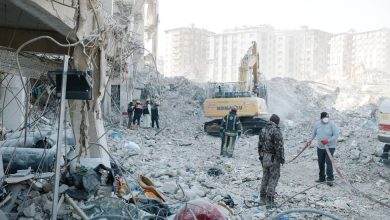Once a Climate Leader, Brazil Falls Short in Glasgow

RIO DE JANEIRO — Brazil, a global climate leader turned environmental villain under President Jair Bolsonaro, approached the United Nations climate conference in Glasgow ready to prove it was changing course, with commitments to create a green jobs program, cut carbon emissions and curb deforestation.
But even as John Kerry, the U.S. climate envoy, said on Twitter that those steps added “crucial momentum” to combating climate change, environmentalists argued that the plans lacked ambition and the details that would make them credible.
And Mr. Bolsonaro’s conspicuous absence from the summit raised questions about his commitment to the reversal.
A week before the conference started, Mr. Bolsonaro said in an interview that he would not attend for “strategic” reasons, without clarifying. Days later, Vice President Hamilton Mourão suggested Mr. Bolsonaro wanted to shield himself from exposure.
Mr. Bolsonaro, who took office in 2019, has overseen a surge in deforestation of the Amazon and widespread neglect of environmental regulations, which have made him the target of condemnation at home and abroad.
If the president attends the summit, “everyone will throw rocks at him,” Mr. Mourão told reporters. Instead, he said, “there will be a robust team there with the ability to, let’s say, carry out the negotiation strategy.”
Days before the conference, Brazil’s government announced a policy to create green jobs while preserving the country’s vast forests. Then, on Monday, Brazil committed to cutting emissions in half by 2030, achieving carbon neutrality by 2050 and ending illegal deforestation by 2028, a step up from its pledge last year.
In a video shared in one of the summit’s side events, Mr. Bolsonaro called Brazil “a green power” and declared that “in the fight against climate change, we have always been part of the solution, not the problem.”
But Mr. Bolsonaro’s absence goes against the argument that Brazil is reversing course, said Natalie Unterstell, the president of the Institute Talanoa, a climate policy think tank.
“It’s a big contradiction,” she said. “At the moment when he should be confirming that he wants to be more ambitious about climate issues, he isn’t present.”
Environmentalists and political opponents in Brazil were also quick to poke holes in the announcements. The green growth plan lacked details to make it credible, they said, and the commitments on emissions included a significant caveat, revealed by examining the proposal’s technical aspects.
In 2015, as part of the Paris Agreement, Brazil had promised to slash carbon emissions by 43 percent. Now it has vowed to cut emissions by 50 percent. But what looks like an improvement is not, experts said. The base number used for the calculation in both cases — Brazil’s emissions in 2005 — has been adjusted since the first pledge. So each commitment translates to cutting roughly the same amount of carbon dioxide, around 1.2 gigatons.
“It’s an old new commitment,” said Marcelo Ramos, a representative from the state of Amazonas and the deputy speaker of Brazil’s lower house. “Once again Brazil fails to show ambition.”
Then there is the matter of Brazil’s record. By law, the country was supposed to have already started slashing its emissions. Instead, emissions grew to levels not seen since 2006, making it one of the few nations where emissions rose during the pandemic.
The increase was largely driven by a surge in deforestation. From August 2020 to July 2021, Brazil’s portion of the Amazon lost 4,200 square miles of tree cover, according to the latest numbers published by the National Institute of Space Research. If Brazil had followed its previous deforestation commitments, the rate would be about a third of what it is now.
Still, the timeline released by the government in time for the Glasgow summit would have the country sharply reverse course and slash deforestation by 15 percent starting next year — a decrease Brazil has not seen in almost a decade.
The lack of credibility in Brazil’s commitments is already hurting its economy. Dozens of environmental and human rights groups wrote a letter urging the Organization for Economic Cooperation and Development to consider the country’s poor environmental record before accepting it as a member of its club of developed nations. It has also led political leaders in Europe to delay the conclusion of a free-trade treaty between the European Union and the South American bloc Mercosur.
Many of Brazil’s other leaders are eager to show there is more to the country than Mr. Bolsonaro’s vision. Executives for some of Brazil’s top companies and over half of the country’s state governors are in Glasgow presenting their own plans.
“It’s hard to do a lot without the federal government,” says Marcello Brito, a spokesman for the Brazilian Coalition on Climate, Forests and Agriculture, a nonprofit that joins leading agribusiness companies and environmentalists. “But we will show our faces and find a way to attract some of the green financing available in the world.”
As the most biodiverse country in the world, with a power grid that relies mostly on clean energy, Brazil could greatly benefit from a greener global economy. Ending illegal deforestation and restoring degraded land could help the country go beyond its carbon-dioxide emissions target, allowing it to sell the difference as carbon credits to countries and companies that cannot meet their own goals alone.
The regulation of this international trade of emissions credit, which is described in Article 6 of the Paris Agreement, is one of the most ambitious goals nations are hoping to accomplish in Glasgow. The global market could generate $167 billion a year by 2030, according to the International Emissions Trading Association.
And if it is able to take steps to protect its environment, Brazil could be particularly well positioned to benefit.
“We could use the revenue from a carbon market to reduce inequality,” said Ms. Unterstell, the climate policy expert. “Decarbonization doesn’t impose a sacrifice to the Brazilian economy — quite the opposite.”



